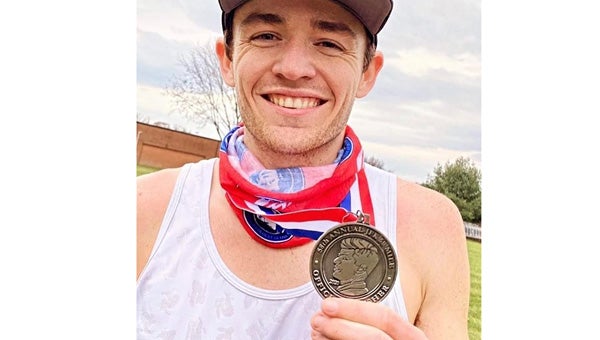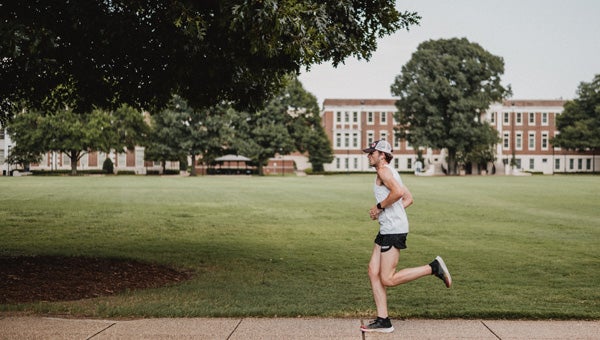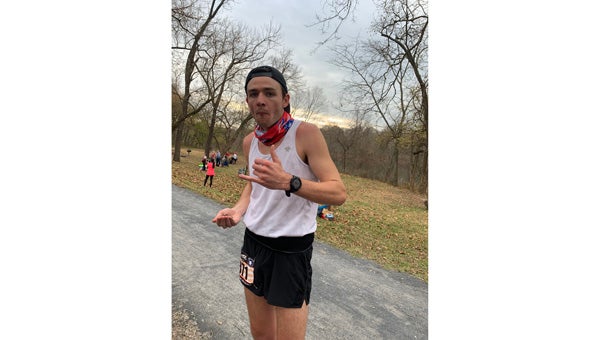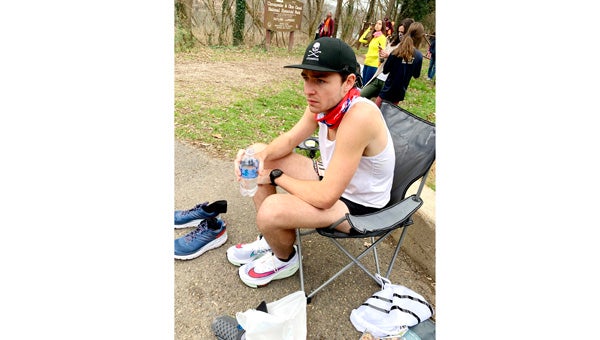Cathedral graduate completes grueling 50-mile race
Published 10:15 pm Friday, December 4, 2020
|
Getting your Trinity Audio player ready...
|
Some may think Henry Carpenter is a glutton for punishment.
On Nov. 21, he ran 50 miles — on purpose.
He finished the course in 9 hours, 22 minutes and 49 seconds.
Carpenter, 20, is the youngest child of Todd and Emily Carpenter of Natchez and a 2018 graduate of Cathedral School. He is now in his junior year at the University of Alabama.
(Read Henry Carpenter: Just the Facts here)
Carpenter participated in the 58th Annual JFK 50 Mile, the oldest ultra marathon in America.
He finished 175th out of 702 runners on a course that began in downtown Boonsboro, Maryland. It snaked 15.5 miles on a single, rocky footpath through the Appalachian Trail and connected to the Chesapeake and Ohio Canal towpath, a mostly dirt trail that runs along the Potomac River, for 26.3 miles. The final 8.4 miles of the race were on paved roads to the finish line in Williamsport, Maryland.
Eyeing a goal
Carpenter first planned to run a 50-mile race in March, but nationwide COVID-19 shutdowns changed that. Soon after, though, he started planning for the JFK 50 Mile to achieve his 50-mile goal.
Running is a big part of Carpenter’s life, but wasn’t always so. His sport was football, and he excelled in it at Cathedral, but he knew his football career would end at the high school level.
In January 2018, the second semester of his senior year and his football career over, he took up running.
“I’ve always been around running. My dad runs and has run marathons. I had never really been interested in it, but my senior year of high school, I needed some sport after football. I needed something to do and I wanted to lose some weight,” he said.
Soon he signed up for and ran a half marathon. Then, on July 29, 2018, he ran his first marathon — the San Francisco Marathon — in 3 hours, 54 minutes and 58 seconds, finishing 1,206 our of 5,264 runners.
“Running is a pretty big part of my life now. I get up and run almost every morning. My last day off was Sept. 30 and I ran all the way up until last Thursday when we had to travel,” Carpenter said. “My ultimate goal is to run about 100 miles.”
Running his first 50 miles
“Physically and mentally, running a marathon, which is 26.2 miles, and running a 50-mile race are astronomically different. I’ve gone the marathon distance nine or 10 times. I know what it’s like to handle that one,” he said.
The difficulties and punishment his body would take during the 50-mile race were unfamiliar and grueling.
“The stretch from mile 27 to 38 was the longest 11 miles I’ve ever run. I had to push to keep going just to get to the next aid station,” he said. “I had a pretty good idea I was going to finish the race, but there were points I was thinking, ‘Why am I doing this?’ But I never thought about stopping. I wouldn’t have been OK had I quit. I would never forgive myself for doing that. There was never a time that I thought, ‘You can stop now.’ ”
Carpenter said the first portion of the race — the 15.5 miles on the Appalachian Trail — was technically difficult.
“We were on a single track. You had to stay mentally sharp to make sure you didn’t slip and fall. My legs weren’t in trail shape like they needed be. At lots of points going downhill, my knees were feeling kind of weak.
“After having to deal with that first 15 miles — I had never run a race that felt like that — my legs were in the worst condition they could have been to face that next 35 miles. It’s hard to describe if you’ve never felt like this. It was hard to keep food down. I could feel myself starting to get a little nauseous.”
Miles 15.5 to 42 were on the Chesapeake and Ohio Towpath.
“It was all beat-down dirt, which was better than pavement, but can get pretty boring. It was tough not having any spectators to cheer you on. I couldn’t see my parents until mile 27. And we couldn’t have any personal listening devices. They wanted us to be able to hear race managers and race directors giving instructions, particularly with COVID going on. You had to find your own motivation,” he said.
For Carpenter, that motivation came in the form of a fellow runner, who kept passing him.
“I was running off and on with this girl. Her strategy was to run two miles and take a break. She kept passing me. She would stop and I would pass her, then she would take off running again and she would pass me. I was getting annoyed.
“At the aid station at mile 42 she stopped to go to the bathroom or something and said she would see me soon. In my mind, I thought, ‘You aren’t going to see me again unless it’s looking at my back.’ And I didn’t ever see her again. I was not letting her pass me. I was making sure she would not pass me again,” he said
Physical and mental toll
At mile 38, when Carpenter saw his parents for the second time since the beginning of the race, he was beginning to really feel the pain of the race.
“I had salt all over my face. I lost a ton of electrolytes. I sat there for a few minutes and looked at race data. I changed my shoes at that point, too. It was very hard to get going again. I think there is a lot of stuff that goes into getting up and starting to run again. I had set the goal for myself and I was proving to myself that I could do it. And you want to make the people you love proud. I wouldn’t want them to look at it and see that I quit when it got hard.”
During the race, Carpenter said he drank something every 15 minutes and then the next 15 minutes, he would eat some solid food, about 100 calories worth, like trail mix.
His meal before the race was a “big veggie sandwich.”
“When we came off of the towpath and got onto paved roads, it was straight uphill. It hurt my soul a little bit just to see that hill and I just hiked up it. The last eight miles were rolling hills all the way to the finish.
“The next aid station was at mile 44.2 and they had water and some boiled potatoes and they would put salt on it for you. I had one. At that point, I was feeling pretty bad and it was off and on walking and running to the very last aid station.
“I never saw the one mile to go marker. I could see a fork in the road and a cop was there telling people to go right. I couldn’t see past that because of a hump in the road, but when I got over that hump, I saw we were done now and I just ran as fast as I could to the finish line.”
Recovery
After crossing the finish line, Carpenter said he was flooded with emotions of all sorts.
“I was in pain. So much pain! I was also overwhelmed with a feeling of gratitude. I felt just a lot of emotions. I was very thankful my parents were there to carry me to the car. I just kind of collapsed into them and they had to hold me up,” Carpenter said.
In fact, Carpenter could not make it to where his parents had parked their car.
“Dad went and got the car. I lied down in the grass of this high school. I felt like I was going to pass out or throw up or both.
“We finally got back to the hotel and I was white and my lips were blue. I was just drained. It was hard to eat anything. I didn’t want anything sweet, nothing dense with carbs, but mom was like, ‘You’ve got to eat something.’ She had this caramel apple Cow Tale, and, I mean, that was the best thing I’ve ever eaten. She got me some Starburst and Skittles and I ate those. It took me 30 to 45 minutes to come back around. I just felt awful. My legs were throbbing. My stomach felt like it was doing somersaults. It was a weird crazy feeling.”
“He was white as a sheet, and I really thought he was going to pass out. Henry is very disciplined in his eating. He does not eat a lot of sugar, and I knew his sugar was low,” Emily Carpenter said. “His sugar had bottomed out, and we just pumped him with sugar.”
The sugar did the trick, and by dinnertime, Carpenter ate six pieces of pizza and drank a couple of Gatorades.
“Once I was replenished, I felt better. I slept well, didn’t have any problem with cramping. I went to bed at about 9:30 p.m. and woke up at 5:30 a.m. I could have slept longer, but we had to catch our flight home,” he said.
A proud momma
Emily is impressed with Henry’s drive and determination.
“I think Henry, being the baby, kind of had to follow in the footsteps of (siblings) Mary Kathryn and Jackson, who were always very driven. Henry is the more natural athlete, but when he was younger, he didn’t have that drive. I think he felt like he was in their shadow,” she said. “I was the baby in my family, and I relate to that.
“What separates him is his natural ability. Now that he has that drive, he has come into his own. He is his own guy.”
She said the experience of the 50-mile race was exciting and at one point, scary.
“We saw all of these elite athletes running this race,” she said. “Henry saw a fair number of people who are elite runners who he follows. That was very exciting.
“At the same time, it was nerve wracking. I didn’t know how long it would take to run 50 miles and I was getting worried. He wasn’t coming when I thought he should be coming. I told Todd we may need to send somebody.”
It wasn’t long before she spotted Henry topping that last hill and heading for the finish.
“All I could do was yell, ‘Run, Henry! Run, Henry!”
The Carpenters were able to see Henry at several points during the race. When she saw her son at an aid station at the 38-mile marker, she was overwhelmed by what he was pushing himself to accomplish.
“We know Henry well, and I could tell he didn’t want us to speak to him, no coaching, nothing. He was looking pretty spent at that point. But you know what, that child got out of that chair and he ran. He didn’t walk. He ran. It was a very proud time for us when he came across that finish line.”
“I could not be prouder of Henry,” said Todd Carpenter. “He has now run the longest distance of anyone in the family. I know that territory out beyond 20 or more miles and the physical and mental battles he had to cope with. It changes your relationship with pain and with difficult circumstances in general in a positive way. His mental toughness at his age really sets him apart. There is not much he will face in life that he won’t be able to handle.”
No. 1 fan
On March 7 of this year, Carpenter ran his second 50-kilometer race, which is just over 31 miles, at the Mississippi 50 Trail Run. He came in second. Right behind him was Natchez physician, Dr. Ed Daly, who finished in third place.
Daly ran the JFK 50 in 2008 and has finished dozens of marathons and ultra-marathons. He and Todd Carpenter have run together for years, including several marathons. Daly’s son, Jack, is also an accomplished ultra-marathoner and has been a mentor to Henry.
“The JFK 50 is quite an accomplishment for a young man in college. Henry has lots of discipline. He is a no-nonsense, nose-to-the-grindstone kind of boy,” Daly said. “We ran the Mississippi 50 Kilometer together back in March and he just blew by me. He is a very strong runner. Henry has the right attitude. He is very humble, very disciplined about everything,” he said.
The JFK 50 is a beautiful course, Daly said, but is an unforgiving race.
“It’s very rocky, very difficult for us Southern runners. It’s an amazing feeling of accomplishment when you finish one of these. You are sore beyond belief, but what a great feeling it is to know that you finished that. It takes lots of hard work to build up to a 50 miler. It’s exceedingly brutal. I’m just very proud of Henry. Most kids his age are hanging out and partying. Henry has his head screwed on really well. He has a great future.”
What’s next?
Carpenter said he plans to hone his running skill and plans to run the Mississippi 50 Mile Trail Run in March 2021.
His training runs can be anywhere from 13 to 20 or more miles.
“I use my time running alone in a lot of different ways. I use it to think a lot about stuff going on in my life. I use it to think about other goals I want to set. I use it for prayer sometimes. I mainly listen to music while I’m doing all of that.
“Running to me is a very self-centered sport. Most of the time it’s just you and the road and the goal you set for yourself. The external motivation doesn’t last very long. You must have that internal motivation that is going to push you to finish. It all comes down to you. I didn’t want to fail.”










